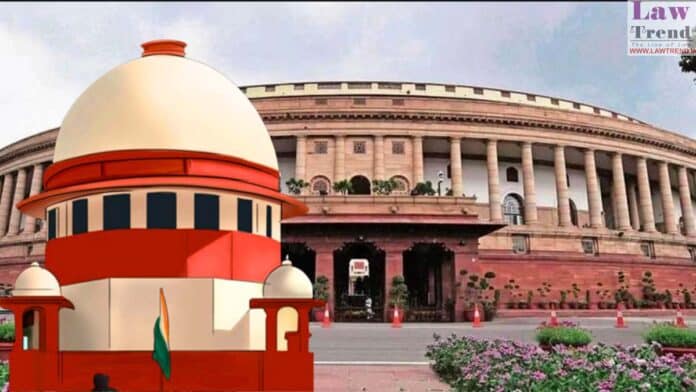The Centre has promulgated ordinances from time to time to nullify and override Supreme Court judgements, with the latest being the Government of NCT of Delhi (Amendment) Ordinance which takes away the control over services from the Delhi government.
The Union cabinet approved the bill that will replace the ordinance promulgated for the creation of an authority for transfer and posting of Group-A officers in Delhi on Tuesday and Home Minister Amit Shah will table it in the Lok Sabha the coming Monday.
The hotly-debated action of promulgating ordinances to circumvent judicial pronouncements on critical issues is a key power with the executive arm of the government when Parliament is not in session, and is being exercised since Independence by governments wedded to disparate ideologies.
The NDA government promulgated the Government of National Capital Territory of Delhi (Amendment) Ordinance, 2023 on May 19 to create an authority for transfer and posting of Group-A officers in Delhi and took away the services from the legislative domain of the Delhi government.
The ordinance came a week after the Supreme Court handed over the control of services in Delhi excluding police, public order and land, to the elected government.
Prior to this, the Centre brought two ordinances that can facilitate the extension of the tenure of the Directors of the Enforcement Directorate (ED) and the Central Bureau of Investigation (CBI) up to five years.
The move came after the apex court in 2021 ruled that the “extension of tenure to officers who have attained the age of superannuation should be done only in rare and exceptional cases”.
In another such measure, the Union government brought the Tribunals Reforms (Rationalization and Conditions of Service) Ordinance, 2021 prescribing the tenure, age of retirement and conditions of service of the members of tribunals. The ordinance reduced the tenure of chairpersons and members of tribunals to four years instead of the earlier five fixed by the apex court.
In 2018, an ordinance was issued to overturn an apex court order on certain safeguards against arrests made under the SC/ST law after protests across the country.
Right from the first Prime Minister Jawaharlal Nehru to the incumbent premier Narendra Modi, the Centre has been promulgating ordinances to override judgements of the top court.
The first such instance was the passing of an amendment bill in 1951 to nullify the effects of the judgment of the Supreme Court in the Champakam Dorairajan case.
It was related to a quota system in college admissions in Madras in 1950 which was based on the “Communal Government Order” issued by the Madras Presidency in 1927. Under it an individual’s caste was considered for granting admissions in government colleges and for jobs.
The Supreme Court had then held that admissions cannot be granted on the basis of the communal GO.
To circumvent this, the Nehru government brought the first amendment to the Constitution by inserting Article 31A and 31B in the ninth schedule with effect from June 18, 1951 to ensure that certain laws are held to be valid even if they violated the fundamental rights of citizens.
Also Read
In another instance, a constitutional amendment was enacted to nullify a judgment arising in the case of Indira Gandhi Vs Raj Narain in which the order of the Allahabad High Court setting aside the election of Gandhi was challenged.
During the pendency of the appeal before the Supreme Court, Parliament enacted the 39th constitutional amendment (valid retrospectively) which added Article 392A to the Constitution and stated that the elections of the President, Vice President, Prime Minister and the Lok Sabha Speaker cannot be challenged in any court in the country, and it can be done only before a parliamentary committee.
An ordinance is promulgated by the President on the recommendation of the Union Cabinet when Parliament is not in session. It is mandatory for Parliament to adopt a law to replace the ordinance within six weeks of the commencement of the next session.




